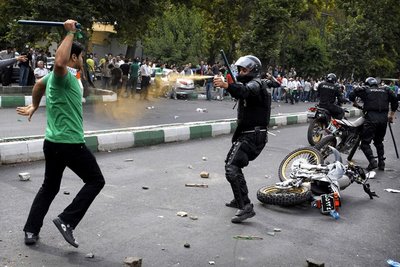
| THINK-ISRAEL |
| HOME | January-February 2010 Featured Stories | Background Information | News On The Web |
Here's what a serious plan to undermine the regime in Tehran would look like.
Al Qaeda bombers on U.S. airliners need prompt attention, but it is Iran, a supporter of terrorism now developing the capacity to fire nuclear-tipped missiles, that may pose the greatest threat to global stability and American security.
That threat can be diminished three ways: by military action, by compromise by Iran's regime, or by a new, less bellicose government taking power in Tehran. The first two appear unlikely, but the third, at least since protests broke out last June after the presidential election, seems more and more realistic. Yet so far the United States and its allies have shrunk from seriously encouraging that third way.

Immediately after the post-election, Green Revolution protests began in Iran, some policy makers argued that overt U.S. support would allow the regime to claim that those in the opposition were somehow our agents. Even with no evidence, the regime did that anyway — to little effect.
So how can the U.S. support the opposition? The key is strategic communications that integrate words and deeds to achieve a major political goal — in this case, changing the character of the Iranian leadership. Everything that we do, everything that we say — and everything that we don't do and don't say — should be coordinated to meet this goal.
Such a policy would have four separate tasks:
Here third parties, rather than the U.S. government, should play the main role. Dissidents should be reminded that others have succeeded on the same path they are travelling.
We should, for instance, publicize reports on what worked in Ukraine or Georgia, spread testimony by leaders like the Czech Republic's Vaclav Havel, and distribute, in Farsi, guides to nonviolent change like Gene Sharp's "From Dictatorship to Democracy" and Peter Ackerman's "A Force More Powerful." It's time to dub into Farsi documentaries on the fall of Ceausescu, Milosevic and Pinochet; the transitions in South Africa and Poland; and the achievements of the U.S. civil-rights movement.
Despite Iran's oil wealth, the economy has for years been in miserable shape thanks to bad management, corruption and the squandering of funds on Arab terrorist groups and the nuclear program. The slogans of the protestors demonstrate that they are connecting the dots between the regime's foreign policy and economic privation.
Opposition movements succeed through sharing and disseminating information. Broadcasting by the taxpayer-funded Radio Farda and Voice of America satellite TV should be ramped up, and we should encourage the U.K. to do the same with the BBC. We also should vigorously protest attempts by Iran to jam broadcast signals in defiance of international law, back private media — from satellite TV pitched at young people to cell-phone messaging to social networking — and help Iranians get the technology to overcome regime attempts to block and censor.
For this last task, America's comparative advantages — our technology and imagination — are the best tools. For example, to counter the claim that the West wants to hold Iran back, the U.S. government, using a private foundation, could rally CEOs in Silicon Valley (and Japan, India and Indonesia, for that matter) to offer Iranian engineering students seminars on high-tech entrepreneurship. We could saturate the airwaves of Iran with messages from, say, Gov. Arnold Schwarzenegger seeking applicants for the seminars. The Iranian government would likely oppose such a program and the message would be: "Your regime, not the West, wants to keep you down."
Similarly, we should be using all our tools, including intelligence, to track the individuals responsible for cracking down on the protesters, and to publicize their identities. Naming and shaming perpetrators would put the regime on the defensive and assure the protesters that their sacrifice will not be forgotten. As we know from Soviet dissidents, moral support works.
A serious strategic communications program for Iran could have dozens, even hundreds, of programs like these. It should extend across government agencies with clear leadership and include private-sector participation.
Too often in foreign policy our interests demand that we compromise our core values. With Iran, however, we have been blessed with remarkable luck: Our strategic and moral imperatives stand in perfect alignment. And Iranians like Americans.
The Iranian challenge appears more amenable than any other serious national threat to a soft-power solution. Let's get going.
Mr. Glassman, executive director of the George W. Bush Institute in
Dallas, served as under secretary of state for public diplomacy and
public affairs in the last administration. Mr. Doran, a visiting
professor at New York University's Wagner Graduate School, was deputy
assistant secretary of defense for support to public diplomacy from
2007-8.
This article appeared January 21, 2010 in the Wall Street Journal
as an Opinion piece.
| HOME | January-February 2010 Featured Stories | Background Information | News On The Web |